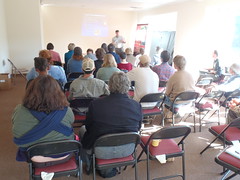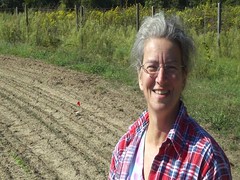Acording to U.S. Drought Monitor, drought throughout south Georgia and surrounding areas is either extreme or exceptional, and has been for months.
Here you can see detail for Georgia:
Continue readingAcording to U.S. Drought Monitor, drought throughout south Georgia and surrounding areas is either extreme or exceptional, and has been for months.
Here you can see detail for Georgia:
Continue reading  Does the jar grow around them?
Does the jar grow around them?
Here’s the video:
Planting Pickles
Video by John S. Quarterman of Gretchen Quarterman planting cucumbers
at Okra Paradise Farms, Lowndes County, Georgia, 16 April 2012.
-jsq
For many years big agro has treated the world’s health as an economic externality, a problem for somebody else that did not affect its own bottom line. That is starting to change, most recently in Argentina.
Anthony Gucciardi wrote for NaturalSociety 11 April 2012, Explosive: Monsanto ‘Knowingly Poisoned Workers’ Causing Devastating Birth Defects,
In a developing news piece just unleashed by acourthouse news wire, Monsanto is being brought to court by dozens of Argentinean tobacco farmers who say that the biotech giant knowingly poisoned them with herbicides and pesticides and subsequently caused ”devastating birth defects” in their children. The farmers are now suing not only Monsanto on behalf of their children, but many big tobacco giants as well. The birth defects that the farmers say occurred as a result are many, and include cerebral palsy, down syndrome, psychomotor retardation, missing fingers, and blindness.
 This would be the same Monsanto that was convicted of chemical poisoning in France.
This would be the same Monsanto that was convicted of chemical poisoning in France.
But this is once again far away in a small country of which we know nothing, right? Wrong:
The farmers come from small family-owned farms in Misiones Province and sell their tobacco to many United States distributors. The family farmers say that major tobacco companies like the Philip Morris company asked them to use Monsanto’s herbicides and pesticides, assuring them that the products were safe. Through asserting that the toxic chemicals were safe, the farmers state in their claim that the tobacco companies ”wrongfully caused the parental and infant plaintiffs to be exposed to those chemicals and substances which they both knew, or should have known, would cause the infant offspring of the parental plaintiffs to be born with devastating birth defects.”
Still, it must be some obscure poison only sold in the third world, right?
Wrong:
The majority of the farmers in the area used Monsanto’s Roundup, an herbicide with the active ingredient glyphosate that has shown to be killing human kidney cells. What’s more, the farmers say that the tobacco companies pushed Monsanto’s Roundup on the farmers despite a lack of protective equipment. In other words, these farmers — many in dire economic conditions — were being directly exposed to Roundup in large concentrations without any protective gear (or even experience or skills in handling the substance). Still, the farmers say the tobacco giants required the struggling farmers to ‘purchase excessive quantities of Roundup and other pesticides’.
That would be the same Roundup that farmers use around here all the time, without protective equipment. The Roundup we already knew was Continue reading
 Potatoes red and white, peas, onions, turnips, collards, and radishes!
Potatoes red and white, peas, onions, turnips, collards, and radishes!
Here’s a playlist:
Growing in the Garden
Gretchen Quarterman explains it all for you, assisted by Brown Dog and Yellow Dog.
Videos by John. S. Quarterman for Okra Paradise Farms, Lowndes County, Georgia, 27 March 2012.
-jsq
 The detailed schedule for the
South Georgia Growing Local Conference
is posted now on the
on the facebook event.
It’s also below.
The detailed schedule for the
South Georgia Growing Local Conference
is posted now on the
on the facebook event.
It’s also below.
-jsq
 realized nobody else was going to hold a conference
about growing local in the characteristic soils and climate
and with the characteristic foods and culture of
south Georgia, so
okravores met in Tifton
and learned about everything from controling insect to which breeds of cows
produce the best organic milk.
Raven demonstrated
you can make cheese in south Georgia
and Gretchen
demonstrated preserving beautyberry and other jams and jellies,
along with many other interesting talks and demonstrations, and good food.
The South Georgia Growing Local Conference is back,
this time near Reidsville, in January.
realized nobody else was going to hold a conference
about growing local in the characteristic soils and climate
and with the characteristic foods and culture of
south Georgia, so
okravores met in Tifton
and learned about everything from controling insect to which breeds of cows
produce the best organic milk.
Raven demonstrated
you can make cheese in south Georgia
and Gretchen
demonstrated preserving beautyberry and other jams and jellies,
along with many other interesting talks and demonstrations, and good food.
The South Georgia Growing Local Conference is back,
this time near Reidsville, in January.
When:
Saturday, Jan. 14, 2012, 9-5
UGA’s Vidalia Onion & Vegetable Research Center, between Lyons & Reidsville, Ga. & Red Earth Farm, ReidsvilleWhat: Continue reading
Something about circular furrows in a rectangular field….
Will these grow crop circles? Continue reading
 Gretchen explains it all at Okra Paradise Farms:
Gretchen explains it all at Okra Paradise Farms:
Gretchen Quarterman explains gardening at Okra Paradise Farms, 6 October 2011.
Video and pictures by John S. Quarterman.
-jsq
 This item horrified a lot of people:
Animal miscarriages from new fungus or virus in Roundup-read crops?
A reader asked:
This item horrified a lot of people:
Animal miscarriages from new fungus or virus in Roundup-read crops?
A reader asked:
What would you say to someone like myself who wants to make a difference but has no clue where to start? I think that is a big question with my generation.Well, there’s the pumpkin dance. But you don’t have to start with that.
HFCS may be the easiest thing to start with, because it’s labelled. Don’t buy any product that has High Fructose Corn Syrup (HFCS) in it. You’ll be surprised how many do. At restaurants, check the condiments, don’t use them if they have HFCS, and inform the wait staff why you’re not. When people ask why you’re doing all this tell them. Here’s some background on High Fructose Corn Syrup and Obesity.
This kind of thing is working: Hunts removes HFCS from all its Ketchups.
 About pesticides, buy local and organic food, like at
Whisk.
Ask for local food at other stores.
Help with a community garden. Join a CSA. Write a letter to the editor.
About pesticides, buy local and organic food, like at
Whisk.
Ask for local food at other stores.
Help with a community garden. Join a CSA. Write a letter to the editor.
You don’t have to do all of these things; these are some ideas. Start small and just do something. Every little bit helps, and you’ll get more ideas as you go along. Your example will help others start.
Also, don’t feel bad about it seeming intimidating. On the one hand we
have the most sophisticated marketing methods the world has ever known,
fueled by megabucks from transnational corporations. On the other hand we
have, er, a few college professors like Michael Pollan, a few farmers who
observe and analyze like Joel Sallatin, a few poets like south Georgia’s
own
 Janisse Ray, and so on. Even so, local and organic food is one of
the few industries that has kept booming right through the economic
downturn. People actually want food that’s good for them and tastes good!
Janisse Ray, and so on. Even so, local and organic food is one of
the few industries that has kept booming right through the economic
downturn. People actually want food that’s good for them and tastes good!
Fortunately, around here we also have Georgia Organics! More about that later.
-jsq
Let’s take a quick tally. 1) Locally grown food uses less fossil fuel getting to market, 2) fresh fruits and vegetables are healthier than packaged foods, and 3) buying locally grown food supports your local economy possibly keeping your would-be deadbeat friends employed.My favorite reason to eat locally grown foods is the taste. Go to a farmers’ market and load up on freshly picked tomatoes, bite into a raw crisp green bean, take home some succulent zuccinni and eggplant to stir-fry – you’ll be hard-pressed to find a more delicious meal.
Yep. That and okra. Anybody need some okra?
-jsq